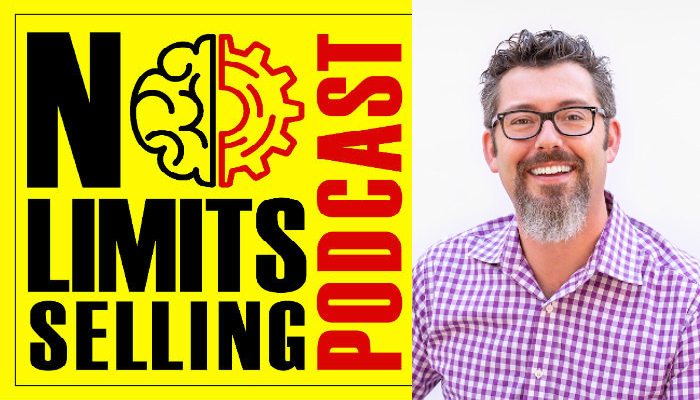Uncover Your Purpose in Life With 3 Simple Tools
On Episode 155 of The No Limits Selling Podcast, we have Jay Rooke, Dad of Twins | Writer | Podcaster | Speaker | Coach.
Entrepreneurs hire Jay Rooke as their coach when they want to harmonize their business, personal development, and spiritual foundations. Formerly a trial attorney for the City of New York, Jay spent a decade in the corporate world and has one foot in each camp so that the spiritual work is grounded in practical solutions.
Jay's "why" is that he always wanted to follow his passion to be an entrepreneur, so years ago he opened a restaurant, which quickly turned into an “involuntary non-profit” and he lost everything. While the experience nearly killed him, it inspired his evolution to serve first-time entrepreneurs by helping them launch their businesses without losing their savings and sanity. Jay is the host of Know Pain, Know Gain—Entrepreneurship Made Real, a podcast and nationally syndicated radio show.

Contact Jay:
[EDITOR’S NOTE: This podcast is sponsored by No Limits Selling. It is a fun, fast-paced podcast that delivers hard-fought business advice that you can implement today to improve your sales and performance]
Interested In Our Real Estate Coaching Services? Explore Our Website: Link
Feeling Not Well Today? You Can Use Our Mindset Boosters App To amp Up Your Mood: Link
Find us on Social Media:
LinkedIn | Facebook community | Instagram
Like what do you listen to? Subscribe to our podcast!
Ready to become fearless? We can help you become fearless in 60 days so you accomplish more in your career Schedule A 15 min Call with Umar
Summary
Introduction
The podcast begins with an introduction of Jay Rooke, a renowned business coach, and mentor. Jay's background in corporate law and his experience as a Silicon Valley startup executive has equipped him with a unique perspective on business growth and development. He is also the host of the "Know Pain, Know Gain" podcast, where he shares insights on entrepreneurship and personal growth.
Jay's Journey and Philosophy
Jay shares his journey, starting from his corporate law career to becoming a startup executive and eventually transitioning into coaching. He emphasizes the importance of personal growth in entrepreneurship, stating that business challenges are often personal challenges in disguise. Jay believes that by addressing these personal issues, entrepreneurs can unlock their full potential and achieve greater success in their businesses.
The Role of a Coach
Jay explains the role of a coach in an entrepreneur's journey. He compares a coach to a mirror, reflecting the entrepreneur's actions and helping them see their blind spots. A coach provides guidance and support, helping entrepreneurs navigate through challenges and make informed decisions. Jay also highlights the importance of accountability in coaching, stating that a coach holds entrepreneurs accountable for their actions, pushing them to achieve their goals.
The Importance of Mindset
Jay discusses the importance of mindset in entrepreneurship. He believes that a positive mindset can significantly impact an entrepreneur's success. Jay emphasizes the need for entrepreneurs to believe in themselves and their abilities. He also talks about the importance of resilience, stating that entrepreneurs must be willing to face failures and learn from them.
Conclusion
In this insightful podcast, Jay Rooke, a seasoned business coach, shares his unique perspective on entrepreneurship, derived from his diverse experiences in corporate law and Silicon Valley startups. He emphasizes the intertwined nature of personal growth and business success, asserting that personal challenges often manifest as business hurdles. As a coach, Jay acts as a mirror, reflecting entrepreneurs' actions, helping them identify their blind spots, and providing guidance and accountability.
He underscores the crucial role of a positive mindset and resilience in entrepreneurial success, encouraging entrepreneurs to view failures as learning opportunities. Jay concludes by urging entrepreneurs to embrace their journey with all its challenges and to fuel their endeavors with passion. This podcast serves as a comprehensive guide for entrepreneurs, offering valuable insights into the importance of personal growth, the role of a coach, and the power of a positive mindset in achieving business success.
Questions & Answers
Who is Jay Rooke?
What is the importance of mindset in entrepreneurship according to Jay Rooke?
What is the role of a business coach in entrepreneurship?
What strategies does Jay Rooke recommend for business success?
What is Jay Rooke's advice for aspiring entrepreneurs?
How can I contact Jay Rooke or learn more about his coaching services?
Don’t miss this opportunity to transform your real estate career with one-on-one coaching. As an experienced real estate coach, I, Umar Hameed, am dedicated to helping you unlock your full potential and achieve your real estate goals. To learn more about who am I and my clients ↓
If you’re ready to take the next step, book an appointment with me today and begin your journey toward success in the real estate industry.
